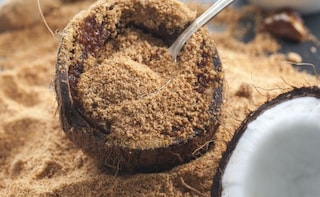Regarded as a better alternative to refined sugar, coconut sugar is the dehydrated and boiled sap of the coconut palm. Coconut sugar has caught the attention of many of those who are health conscious because of its low fructose content and low glycemic index. It also contains traces of some minerals and antioxidants as compared to regular white sugar. Another factor that gives coconut sugar an edge over the other sweeteners is that it is not refined or chemically altered and contains no artificial ingredients or synthetic substances. Coconut sugar is not a direct derivative of coconut, it is the boiled and dehydrated sap of the coconut palm which is collected in a container. It looks and tastes much like clumped brown sugar with a slight hint of caramel. It is used widely as a natural sweetener in baking and in cooking.
1. Low glycemic index
2. Relatively high on nutrientsContaining about 16 calories and four grams of carbohydrate per teaspoon, coconut sugar may not bring down your calorie intake but Meher Rajput explains, “Your regular white sugar is what we term as ‘empty-calories’ which means that it does not contain any nutrients. Coconut sugar, on the other hand, is high on antioxidants, iron, calcium and potassium."
Here are six amazing benefits of coconut sugar that will convince to to ditch refined sugar.
1. Low glycemic index
Coconut sugar has a glycemic index count of 35, as opposed to the white sugar(GI count: 65)
2. Relatively high on nutrientsContaining about 16 calories and four grams of carbohydrate per teaspoon, coconut sugar may not bring down your calorie intake but Meher Rajput explains, “Your regular white sugar is what we term as ‘empty-calories’ which means that it does not contain any nutrients. Coconut sugar, on the other hand, is high on antioxidants, iron, calcium and potassium."
Advertisement
Coconut sugar is used widely as a natural sweetener in baking and in cooking
Advertisement
Cane sugar is also 50 percent fructose5. Better electrolytesBeing high in potassium, magnesium and sodium, coconut sugar has the ability to regulate the body’s water content. Did you know that it has about 400 times more potassium than white sugar?! So, make sure you use this type of sweetener in moderation.6. Good for the gut
Advertisement
For the latest food news, health tips and recipes, like us on Facebook or follow us on Twitter and YouTube.
Advertisement
